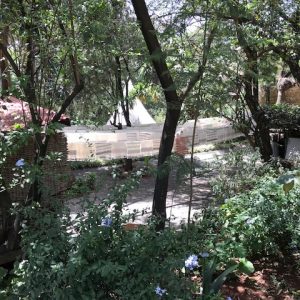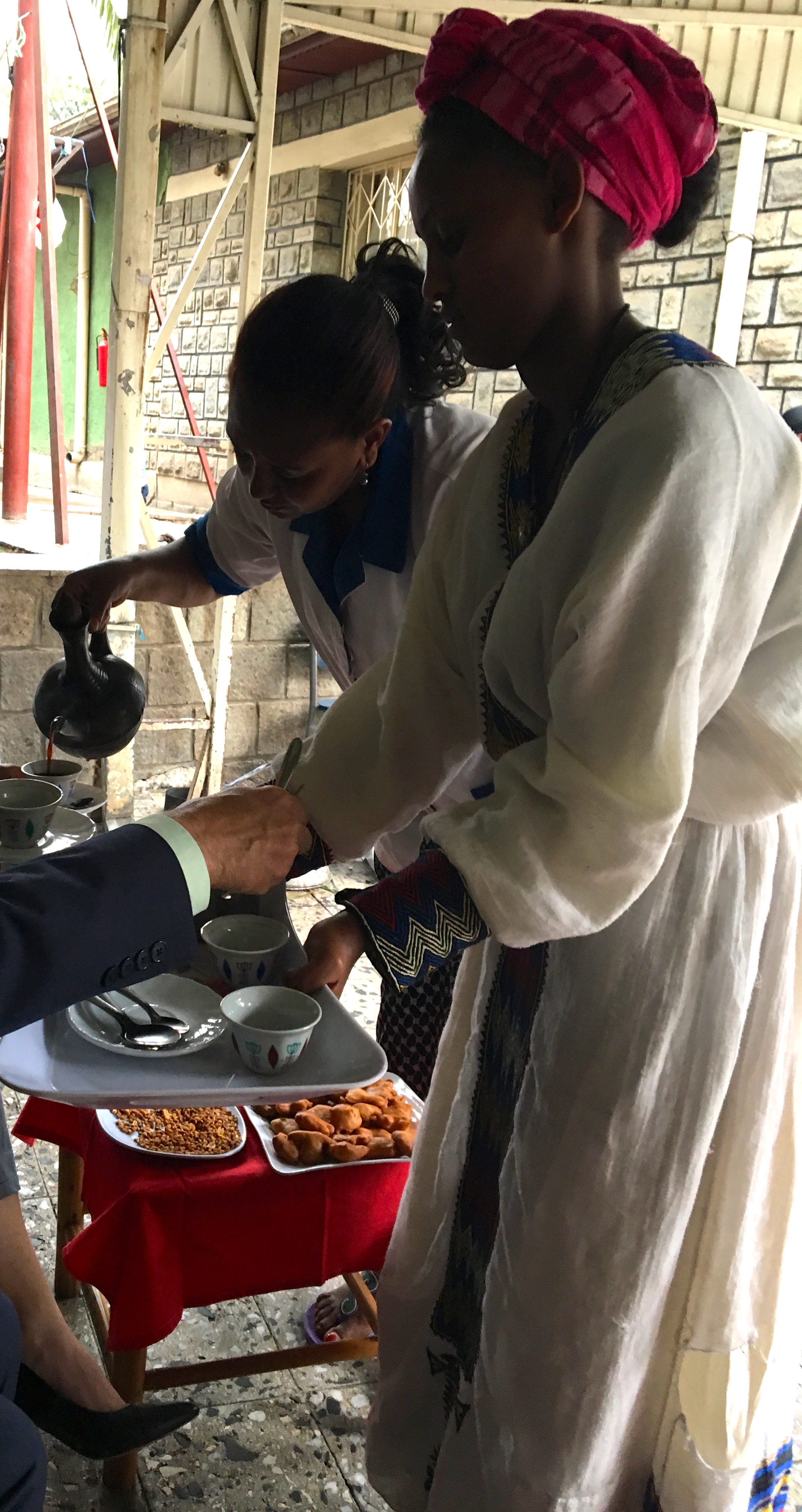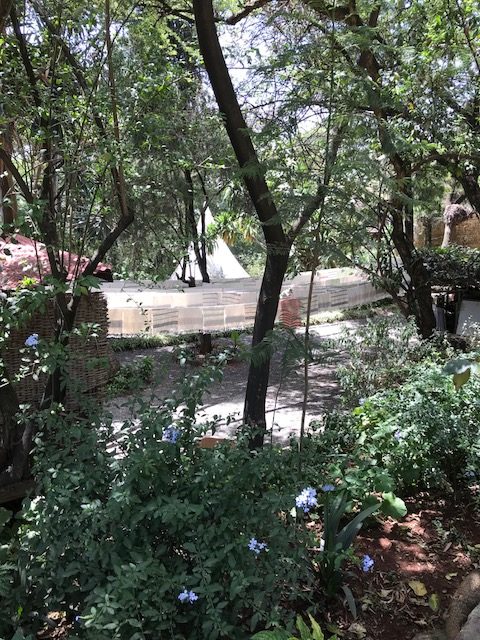Last week, Sasha and I were fortunate enough to have been invited to teach for several days on responses to gender-based violence for the US embassy in Ethiopia (Russ Strand was the 3rd member of our party, and taught on our day off). I spend a great deal of time traveling, both domestically and internationally, but this was my first time in Africa, and I went without any preconceived ideas about what we would experience. Although the trip was relatively brief (we spent only 4 days on the ground), I felt like I was able to see quite a bit of Addis Ababa. If you have any interest whatsoever, please keep reading. Otherwise, come back tomorrow for regular FHO programming.

- Addis Ababa is more than 7700′ in elevation, making the weather in May relatively cool, dry and honestly, not what I expected. It was lovely, and Sasha and I spent each evening sitting outside having drinks or dinner at our hotel, which was a welcome respite from the general chaos of the city. Addis is crowded and sprawling–traffic is impressive and that’s coming from someone who lives in the city with some of the worst traffic in the US. The streets weren’t just crowded with cars, but with people, and without a clear sense of traffic laws or signals. By the time we got back each evening, the idea of venturing back out wasn’t particularly appealing, so adventures were saved for the couple of unscheduled days we had in the city, where both time and the ability to safely negotiate the regulated yellow cabs (as opposed to the unregulated blue cabs and vans, from which we were warned away) was simpler. Addis doesn’t have the kind of violent crime that many countries are known for, but muggings and pickpocket-type crimes are prevalent, and because of what we do for a living, we are probably more vigilant than most. So safety was always on our minds, and we moved around the city accordingly. Most ex-pats we met had stories of having their wallets lifted in some fashion or another, but thankfully we did not run into any issues.
- The focus of the conference was on eradicating GBV in Ethiopia, but until we showed up on Day One, it wasn’t clear who our audience would be, or even what the true goal of the conference was, as it was the first time any embassy had hosted something like this. We went with the impression that our predominant audience would be embassy personnel (healthcare providers, security staff, etc.) with some local professionals also invited. In truth, there were very few embassy personnel and the audience was overwhelmingly local professionals. This made for incredibly rich discussion but required us to shift our plan for teaching on the fly. We had local law enforcement, prosecutors, physicians, victim advocates, UN personnel, and a variety of other individuals. Our sessions were simultaneously translated into Amharic, the local language, although the majority of participants also spoke English. We covered a pretty broad range of topics during the two days that Sasha and I taught, including female genital mutilation/cutting; identifying and addressing IPV in the healthcare setting; injury in sexual assault cases; strangulation assessment; and corroboration in sexual assault. I honestly don’t know how effective the lectures were, but the conversations they spurred felt incredibly valuable.
- As is the case in the US, if you want to know the breadth of what is happening, ask the victim advocates. No one has a better sense of the realities for victims, and we saw this dynamic repeatedly during our time in Ethiopia. At one point I was having a discussion with the group about strangulation assessment and the physicians were politely listening, but they let me know that this wasn’t something they saw frequently in Ethiopia. The UN personnel mentioned that acid attacks were perhaps something that should garner greater attention than strangulation. But the victim advocates stepped in and made it clear that they heard about strangulation over and over again from victims, which surprised many in the room. That multidisciplinary conversation was impactful, and shared perspective made for some great dialogue during our time with the group. And the advocates, as we so often see in the US, seemed to have the fullest picture.
- We met many, many remarkable professionals in our short time there, but none more so than Maria Munir, who started the
 first shelter for rape and domestic violence victims in Ethiopia. The things she has accomplished are impressive, and we were so privileged to see her work in action on our last day when we were invited to visit the shelter. We met (and danced) with many of the teens and preteens, were treated to a traditional coffee and sweet made by some of the residents and staff and received a tour of the facilities. If I had done nothing else, the trip would have been worth it for that visit alone. Their shelter educates the children who live there, provides skills training for the women before they leave to live independently (we received beautiful scarves made by them), provides a huge range of healthcare, including deliveries, for the residents, and has on-site counseling services, child care services and pretty much anything else you could imagine being offered by a small village of dedicated women. You can read more about Maria and her amazing work here.
first shelter for rape and domestic violence victims in Ethiopia. The things she has accomplished are impressive, and we were so privileged to see her work in action on our last day when we were invited to visit the shelter. We met (and danced) with many of the teens and preteens, were treated to a traditional coffee and sweet made by some of the residents and staff and received a tour of the facilities. If I had done nothing else, the trip would have been worth it for that visit alone. Their shelter educates the children who live there, provides skills training for the women before they leave to live independently (we received beautiful scarves made by them), provides a huge range of healthcare, including deliveries, for the residents, and has on-site counseling services, child care services and pretty much anything else you could imagine being offered by a small village of dedicated women. You can read more about Maria and her amazing work here. - To prepare for the trip we followed all recommended CDC guidelines for travel in Ethiopia (with the exception of malaria, because we were only in the city and it was still the dry season). That meant all the immunizations, water and food precautions, and traveling pharmacy for emergencies. Knock wood, we seem to have managed without major issues, so good guidance all the way around.
- Many of you asked how public Sasha and I planned to be about our marital status. The answer is simple. Not public at all. We shared a hotel room, but we reverted back to our days living under Don’t Ask, Don’t Tell, and while it felt lousy to proceed in that fashion, compromising our safety or freedom would most definitely have felt worse. The embassy organizer was aware of our marital status, we took our advice from him, it ended up being fine. Not ideal, but our reality for the week was tolerable. And I was reminded of just how lucky I am that I get to live freely most days of my life, with a family that looks like mine, and not get hassled a whole lot for it. So yeah, it was what needed to be done. It was fine. My heart aches for the hundreds of thousands of people in this world who are not free to love like I get to.
- Sasha was a huge hit. Seriously, what did you expect?
- We identified more commonalities, and many issues felt more familiar than I think we expected. For instance, Ethiopia has several existing or planned “one-stops”, hospitals that essentially mirror the family justice center model with multiple services under one roof. One of the lectures during the conference was from a physician from Gandhi Hospital, the site of a one-stop (Facebook page), and their services mirrored many of the ones we also offer (no DNA testing, though–only two private labs in the country have the capacity to analyze, and they are prohibitively expensive). As Sasha was talking with the group about prosecuting these cases, many of the frustrations in the room about challenges in taking cases successfully to trial were similar to challenges we face in the US every day–consent, coercion, culture. Familiar.
- Shutting up and listening was the most effective thing I could do while I was there. And so I tried to do that as much as humanly possible. Our jobs were ultimately less about teaching and more about facilitating conversation and to that end, I hope we succeeded.
 10. My intention is to stay connected to the remarkable people that I met there–to Maria and her great good works; the physicians who are seeing enormous patient loads because there are too few providers for the population; to the various other professionals who have already reached out for protocols or slides or additional resources. The trip wasn’t an easy one, but it was extraordinary, and I have never met, collectively, a more welcoming, generous, hospitable people than those I met in Ethiopia. We came home with some great stories, an obscene amount of coffee, and burning desire to figure out how we can keep supporting the work happening there. So very lucky to have been able to go.
10. My intention is to stay connected to the remarkable people that I met there–to Maria and her great good works; the physicians who are seeing enormous patient loads because there are too few providers for the population; to the various other professionals who have already reached out for protocols or slides or additional resources. The trip wasn’t an easy one, but it was extraordinary, and I have never met, collectively, a more welcoming, generous, hospitable people than those I met in Ethiopia. We came home with some great stories, an obscene amount of coffee, and burning desire to figure out how we can keep supporting the work happening there. So very lucky to have been able to go.
Our first offering in the FHO store, Injury Following Consensual Sex is now available. If you haven’t ordered a copy yet, you can find it here.


 first shelter for rape and domestic violence victims in Ethiopia. The things she has accomplished are impressive, and we were so privileged to see her work in action on our last day when we were invited to visit the shelter. We met (and danced) with many of the teens and preteens, were treated to a traditional coffee and sweet made by some of the residents and staff and received a tour of the facilities. If I had done nothing else, the trip would have been worth it for that visit alone. Their shelter educates the children who live there, provides skills training for the women before they leave to live independently (we received beautiful scarves made by them), provides a huge range of healthcare, including deliveries, for the residents, and has on-site counseling services, child care services and pretty much anything else you could imagine being offered by a small village of dedicated women. You can read more about Maria and her amazing work
first shelter for rape and domestic violence victims in Ethiopia. The things she has accomplished are impressive, and we were so privileged to see her work in action on our last day when we were invited to visit the shelter. We met (and danced) with many of the teens and preteens, were treated to a traditional coffee and sweet made by some of the residents and staff and received a tour of the facilities. If I had done nothing else, the trip would have been worth it for that visit alone. Their shelter educates the children who live there, provides skills training for the women before they leave to live independently (we received beautiful scarves made by them), provides a huge range of healthcare, including deliveries, for the residents, and has on-site counseling services, child care services and pretty much anything else you could imagine being offered by a small village of dedicated women. You can read more about Maria and her amazing work
2 replies on “10 Things: Ethiopia”
What a powerful and inspiring story, Jen. Your work along with Sasha’s–Amazing! You both contributed to professional and caring hands reaching across the globe for growth, networking, sustainable resources in forensic health and gender violence prevention. I’m in awe of your work and the work of the people in Ethiopia that you shared with us. Truly inspiring! ~Tara
Thanks, Tara!